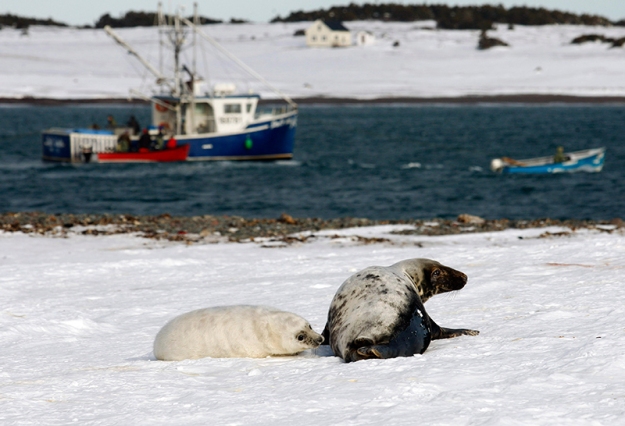I recently returned from a conference in which a coauthor and I presented some research on clubbing seals to death. No, not on the methodology of the ugly business; instead, we were looking at the economic and legal questions raised by a recent pair of decisions by the World Trade Organization’s dispute settlement mechanism. The case raises issues of morality, extraterritoriality, and the dangers of a global trading system adrift.
To set the scene, Canada and Norway both engage in commercial seal hunts. The hunters ultimately sell the seal skins and furs commercially. In part to preserve those skins and furs, the hunters club the seals in the head to stun them before killing them.
More than a few people find this process offensive. In 2009, the European Union adopted measures to ban the sale of seal products in most cases (Foreshadowing: the “most” ends up mattering a lot). This prompted a formal complaint at the WTO later that year. Canada and Norway claimed, in effect, that the European Union had reneged on past promises of trade liberalization. The premise was that when Canada and Norway signed agreements such as the Uruguay Round of trade talks in the early 1990s, they did so on the understanding that their products would gain access to foreign markets. When Europe closed its markets to these particular products, the value of the original deal was diminished in Canadian and Norwegian eyes.
The European Union, which contains 28 countries but negotiates with a single voice at the WTO, responded that it was within its rights. The central trade agreement in question offered a number of exceptions that countries could use to justify the imposition of trade barriers. The language reads, “nothing in this Agreement shall be construed to prevent the adoption or enforcement by any contracting party of measures…”—and then goes on to list the exceptions. Curiously, Europe did not opt for the one that concluded “…necessary to protect human, animal, or plant life or health.” Instead, Europe claimed that its seal trade barriers were “…necessary to protect public morals.”
The European Union recently ended up losing the case, both in front of the original panel and in front of the appellate body, though each used different reasoning. A key factor was the pliability of European moral concern. The original measures that banned seal product trade had, in fact, permitted it when hunts were performed by indigenous communities (e.g. Inuit) or when hunts were part of “marine resource management.” There was no evidence that these types of hunts were any more humane; they were just instances in which other European objectives (e.g. protecting indigenous communities) came into conflict with their expressed moral concerns.
A major challenge for the dispute panels was to figure out just how broad this “public morals” exception ought to be. Though it had appeared in trade agreements for a long time, it had not really been invoked much. Thus, its scope was ill-defined. This was what made the EU Seals case noteworthy; it grappled with a clause that, under an expansive interpretation, could blow an enormous hole in countries’ trade liberalization commitments. After all, countries are permitted to ban products that are dangerous or unhealthy, but there is a natural limitation to this license to block trade—one can test whether the products are, in fact, dangerous. But if countries can block products because they claim their citizenry has moral concerns about the way the product was produced, there are no such natural limits. As one of the conference participants had noted in previous work, a country could express moral concern about products made by trade partners who supported Israel or Taiwan. The intent of the original WTO agreement was clearly not to allow countries to reinstate protection whenever they felt like it. Yet the “moral concern” exception is there on the books. How to strike a balance?
The jurists decided that, at a minimum, the moral concern had to be pure. An abhorrence of seal clubbing, except when done by an Inuit, did not meet that test. This largely postponed the question. It served as a check against simple protectionist motives, in which moral concerns were put forward as an excuse for discriminating against imports. But it leaves open the extent to which countries can use their moral concern about the production methods, policies, and practices of other countries to justify barriers (which may, in turn, look a lot like sanctions).
The question is a difficult one. Judicial systems everywhere fill in blanks in the law when vague phrases demand interpretation. But they usually operate in conjunction with active legislatures, who can clarify the laws if they so choose. Further, justices often undergo careful selection and vetting procedures, as with the US Supreme Court, for which nominees are picked by the president and approved by the Senate. This process gives their interpretations some legitimacy (though, as this last week demonstrated, it hardly immunizes them against criticism).
The WTO dispute settlement mechanism does not enjoy either of these advantages. Global trade talks launched in 2001 have largely stalled and struggled to produce even modest results. The last two full global trade agreements concluded in 1994 and 1979. Policymakers have sometimes been tempted toward complacency about the lack of negotiation progress. The 1994 agreement strengthened dispute settlement; why not just let that system work and enjoy the benefits? The difficult questions of the EU Seals case show the dangers of such an approach. New political questions require new political agreements. Such an agreement at the WTO is long overdue.

